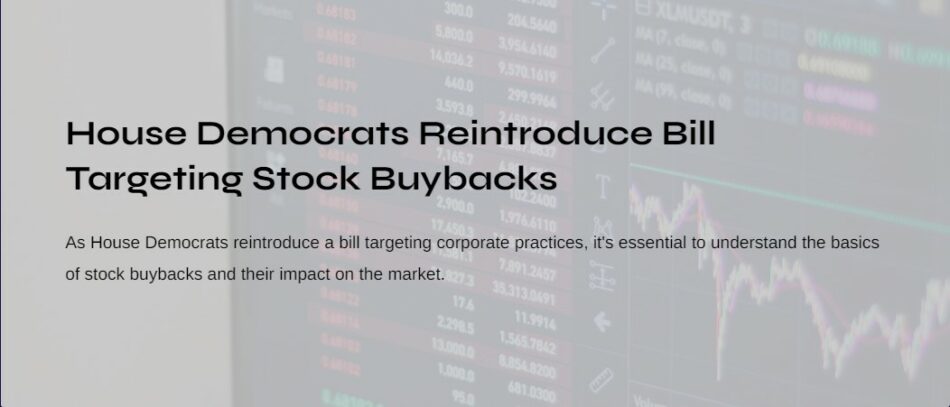Examining the Impact of Stock Buybacks: House Democrats Reintroduce Bill Targeting Corporate Practices
Subtitle: A comprehensive analysis of the Consequences and legislative response surrounding stock buybacks
The contentious issue of stock buybacks has sparked intense debates regarding their implications for workers, consumers, and the overall economy.
In a move aimed at addressing growing inequalities, House Democrats have reintroduced the Reward Work Act, a bill that seeks to ban open-market stock buybacks.
This article delves into the key points surrounding stock buybacks, their consequences, and the proposed legislative response, shedding light on the ongoing discussions shaping the corporate finance landscape.
The Growing Concern: A Quest for Equity
The reintroduced Reward Work Act underscores the mounting unease surrounding the proliferation of stock buybacks. Proponents of the bill argue that corporations frequently use buybacks to artificially inflate stock prices, primarily benefiting shareholders and top executives while neglecting workers and broader economic growth.
To level the playing field, the legislation seeks to ensure fair representation of workers on corporate boards and prevent companies from prioritizing shareholder returns over worker salaries and benefits.
The Impact on Workers and the Economy: Rebalancing Priorities
Companies that allocate substantial funds to stock buybacks limit their ability to invest in worker salaries, benefits, and safety improvements.
This issue gained attention when Norfolk Southern spent billions on buybacks before a hazardous train derailment incident, prompting questions about prioritizing shareholder returns over worker welfare.
The proposed legislation aims to redirect these funds towards workers, recognizing their value and contributions to the corporation, thus fostering a more equitable distribution of resources.
Transparency and Investor Assessment: A Shift Towards Accountability
The Securities and Exchange Commission (SEC) has recently released stricter disclosure rules to enhance transparency regarding buyback behavior.
These rules, set to take effect in the fourth quarter of this year, aim to enable investors to evaluate issuer buyback programs better and comprehend the impact of corporate repurchasing on stock performance.
The proposed bill complements these efforts by addressing underlying issues associated with stock buybacks, including wealth inequality and worker representation, in a more comprehensive manner.
Corporate Practices and Executive Compensation: Striking a Balance
One notable aspect of stock buybacks is their influence on executive compensation, often tied to stock performance.
By focusing on maximizing shareholder returns through buybacks, companies inadvertently incentivize top executives to prioritize short-term stock price gains.
The proposed legislation seeks to recenter workers and consumers in the economy, encouraging transformative change and shifting the Focus from short-term gains to long-term sustainable growth, benefiting all stakeholders involved.
Political Landscape and Future Prospects: Uphill Battle for Reform
The reintroduction of the Reward Work Act by House Democrats highlights their concerns over stock buybacks. However, the bill’s passage faces an uphill battle in a Republican-held House, underscoring the political challenges of comprehensive reform.
Nevertheless, by igniting dialogue and debate, the legislation brings attention to the urgent need to address wealth inequality and ensure workers’ fair representation in corporate decision-making.
These discussions will continue to shape the trajectory of the U.S. economy and the pursuit of economic fairness and corporate responsibility.
Conclusion: A Call for Change in Corporate Practices
Stock buybacks have emerged as a contentious topic, drawing attention to concerns about wealth inequality and the prioritization of shareholder interests over workers’ welfare.
House Democrats’ reintroduction of the Reward Work Act seeks to tackle these issues head-on by proposing a ban on open-market stock buybacks and advocating for workers’ proportional voice on corporate boards.
As the legislative process unfolds, the ongoing debate surrounding stock buybacks will continue to shape discussions on economic fairness, corporate responsibility, and the future trajectory of the U.S. economy.

Pingback: The Power of Stock Buybacks - Stock News